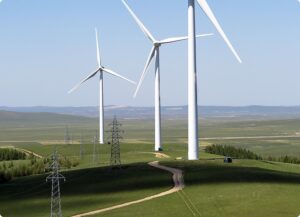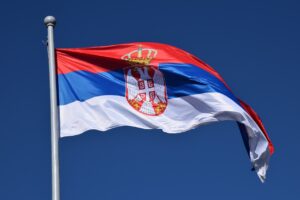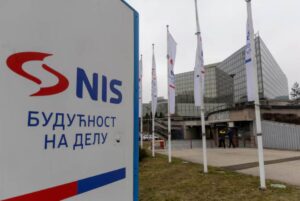
Chinese state-owned company Dongfang Wind Power has signed a contract worth 495 million euros within the framework of the Belt and Road Initiative to supply 48 wind turbines for a 300 MW wind power project in Serbia, Serbian Economist reports, citing the Chinese industry portal Seetao.
According to the sources, Dongfang has conducted detailed site studies and optimized the turbine design taking into account Serbian standards, climatic conditions and power grid parameters. The investor and contractor of the project is China Power Construction Group (PowerChina).
The project, which has been linked in publications to the Vetrozelena wind power plant in the Pancevo region (Vojvodina), involves the installation of turbines with a unit capacity of about 6.25 MW. The expected generation is estimated at about 750-774 million kWh per year.
Vetrozelena is the largest wind power plant under construction in Serbia, with Čibuk 1 with a capacity of 158 MW being the largest operating wind power facility in the country.
https://t.me/relocationrs/2099

According to Serbian Economist, real estate prices in Serbia are market-driven and not “inflated,” said Ervin Pashanovich, a member of the board of the Association of Real Estate Agents of the Serbian Chamber of Commerce and Industry (Privredna komora Srbije).
According to him, the real estate market in the country remains “free” and without interference, and price levels are confirmed by demand. He noted that the average price per square meter of housing in Belgrade is about €2,400, with attention often focused on the most expensive projects, although there are different price levels on the market.
Pasanovic also pointed out that the majority of purchases are made by citizens seeking to resolve their housing issues, rather than investors, since, in his estimation, rental yields imply a long payback period: an apartment costing €100-150,000 can be rented for around €600 per month, which corresponds to a 24-30 year return on investment.
He added that the share of buyers purchasing housing with loans has reached a record 36%, and the share of foreigners among real estate buyers in Serbia is about 2%.
Pasanovic also commented on the application of the law on simplified accounting and registration of property rights, noting that the possible entry into the market of some previously unaccounted properties, in his opinion, will not lead to a noticeable decrease in prices, since a significant part of them are not located in central areas.
According to data from the Republic Geodetic Authority of Serbia (RGZ), in the third quarter of 2025, the average price of apartments on the secondary market in Belgrade was €2,691 per square meter, and in new buildings, €2,598 per square meter.
The RGZ reported that the total volume of the Serbian real estate market in the third quarter of 2025 was estimated at €1.8 billion with 30,511 sales contracts, and apartment transactions accounted for about 60% of the total market value (€1.1 billion).
https://t.me/relocationrs/2087

According to Serbian Economist, Serbian President Aleksandar Vucic said that early parliamentary elections in the country could be held in October, November, or December 2026, the Beta agency reported.
According to Vučić, the date of the elections will depend on the agreements of the political participants, if they are ready for dialogue.
Student groups have previously demanded the appointment of early elections, while part of the opposition claims that the authorities are in no hurry to announce them.

According to Serbian Economist, the Serbian government has adopted a new resolution on financial support for domestic hoteliers, which provides, in particular, subsidies of up to €5 million for cooperation projects with international hotel brands.
The measure is aimed at improving the quality of hotel offerings and increasing tourism revenues, including by extending the tourist season.
Grants may be awarded to companies and entrepreneurs registered to operate in the hotel business and listed in the e-Turista system, as well as investors planning to build new facilities.
It is noted that in order to receive support, the applicant must have a franchise agreement with an international hotel chain or at least a letter of intent confirming future cooperation. The accommodation facility must be categorized as at least four stars. In the document, an international chain is defined as a legal entity that manages at least 50 hotels and operates in at least 10 countries on at least two continents.
The subsidy is provided on a non-repayable basis, with a maximum amount of €5 million per investment project. The list of eligible expenses includes franchise and branding fees, digital integration, and staff training. There is also a requirement that the property purchased with the support must be new, and the investor is obliged to ensure the continuous operation of the hotel in the declared category for at least five years from the date of opening.
Applications will be submitted after the announcement of a public selection process, and the decision on the allocation of funds will be made by a special working group based, in particular, on the business reputation and economic sustainability of the project. Recipients must regularly report to the relevant ministry on the use of funds and provide documentation prepared by an auditing company with professional liability insurance; if the conditions are violated, the state will be able to demand the return of funds with interest.

According to Serbian Economist, the Serbian Ministry of Education has announced the financing of educational materials for migrant schoolchildren, including the translation and adaptation of materials into Ukrainian, as the language barrier remains one of the key challenges in integrating children into the education system.
Education Minister Dejan Vuk Stankovic noted that more than 5,500 migrant and asylum-seeking students have consistently passed through the Serbian education system. According to him, the ministry continues to support schools where migrant children study: mentors and external consultants are involved, and teaching materials are translated into the students’ native languages, currently Ukrainian and Arabic.
Stankovic reported that as part of this work, training events were held for more than 4,000 educators, teachers, principals, and support specialists, and more than 70 schools received support through grants. In addition, more than 3,000 individual support plans have been prepared and more than 10,000 additional classes have been held; support measures also included the distribution of books, textbooks, and school supplies.
The ministry also noted that the work on translating materials and supporting schools is being carried out with the participation of international partners. However, the amount of expenditure and the number of textbooks printed or materials translated into Ukrainian were not disclosed in the ministry’s public statements.

According to Serbian Economist, the Office of Foreign Assets Control of the US Department of the Treasury (OFAC) has issued a temporary license to Serbian oil company NIS, controlled by Russian shareholders, to continue operating until January 23, 2026, said Serbian Minister of Mining and Energy Dubravka Djedovic-Handanovic.
According to her, the decision means the resumption of operations at the Pančevo refinery after a 36-day pause. U.S. restrictions, which came into effect in the fall, had earlier blocked oil supplies via the refinery’s only crude import route – through Croatian pipeline operator JANAF.
NIS operates a refinery with a capacity of 4.8 million tons per year and the largest network of gas stations in Serbia (327 stations), providing about 80% of fuel consumption in the domestic market.
Earlier OFAC gave NIS a deadline of March 24 to negotiate the sale of the Russian owners’ stake; in the company’s capital structure Gazprom owns 11.3%, Gazprom Neft – 44.9%, the Serbian state owns 29.9%. Serbian President Aleksandar Vucic reported that Gazprom was in talks with Hungary’s MOL about a possible deal.
https://t.me/relocationrs/2042